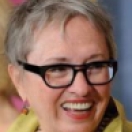Arizona State University is part of a nationwide push to improve the way data is collected about teachers and to use it to improve learning — especially for poor children.
Deans for Impact is a new advocacy group of leaders from 20 teacher-preparation programs across the country, including Mari Koerner Koerner, dean of the Mary Lou Fulton Teachers College since 2010, started her career as a second-grade teacher on Chicago's West Side., dean of the Mary Lou Fulton Teachers College at ASU.
Koerner, dean of the Mary Lou Fulton Teachers College since 2010, started her career as a second-grade teacher on Chicago's West Side., dean of the Mary Lou Fulton Teachers College at ASU.
The group is calling for states to expand the data they collect on student achievement, according to a policy statement called “From Chaos to Coherence” released earlier this week. The deans want that information to be linked to teachers and then to the colleges that prepared them.
The goal is not to punish teachers but to improve the way they are prepared, Koerner said.
“It also isn’t to brag about what we’re doing,” she said. “It’s about finding out how we can do better.”
Deans for Impact surveyed 23 teacher-prep programs and found that currently, there is no uniformity in the way data is collected, no way to access it and no way to compare it across states.
The proposal is common sense, said Koerner, who noted that the group includes deans from Johns Hopkins University, the University of Chicago and the University of Southern California.
“These are universities that are well known for their research, and they know that data matters,” she said.
The plan is controversial for several reasons, including colleges’ resistance to change, fear of “standardization” and opposition to evaluating teachers based on scores.
“It isn’t standardization,” Koerner said. “How you get to these outcomes will depend on your faculty and the context of your program.
“No one is saying the courses have to be the same or the content has to be the same,” she said.
“I wouldn’t want someone dictating to me how we do our programs, but I can understand wanting to know how prepared our teachers are.”
— Mari Koerner, dean of the Mary Lou Fulton Teachers College at ASU
Koerner said that measuring student achievement is much more than test scores and could include whether a teacher’s students had to repeat third grade and whether they went on to graduate from high school.
The proposal also would cost money. States would have to upgrade their data collections to meet a standard. The deans are calling for new policies to make that happen.
“The Arizona Department of Education has been very gracious to work with us as much as their system allows them to,” Koerner said.
She noted that ASU is able to access an important statistic from the state: After three years, Mary Lou Fulton graduates have a 20 percent higher retention rate in high-poverty schools compared with graduates from other colleges.
“So we’re not afraid to get data,” Koerner said.
Steve Wojcikiewicz, vice president of policy for Deans for Impact, wrote on the group’s blog that the data would hold teachers’ colleges accountable: “Specifically, that means information on where graduates find jobs, how many stay in teaching, how well their students perform, what kind of professional evaluations they get from their superiors and feedback from the graduates themselves.”
Deans for Impact is proposing that teachers’ colleges could earn a special certification if they voluntarily set goals, such as graduating a specific number of teachers who work in high-poverty schools. The group also believes colleges should commit to increasing the number of teachers of color.
Koerner said that ASU already requires teacher candidates to pass a test to graduate, and is not afraid of setting the bar high.
She compared the Deans for Impact proposal to the Flexner Report, which was released in 1910 and set a model for doctor training that’s still used today.
“I wouldn’t want someone dictating to me how we do our programs, but I can understand wanting to know how prepared our teachers are,” she said.
More Arts, humanities and education

ASU professor's project helps students learn complex topics
One of Arizona State University’s top professors is using her signature research project to improve how college students learn science, technology, engineering, math and medicine.Micki Chi, who is a…

Award-winning playwright shares her scriptwriting process with ASU students
Actions speak louder than words. That’s why award-winning playwright Y York is workshopping her latest play, "Becoming Awesome," with actors at Arizona State University this week. “I want…

Exceeding great expectations in downtown Mesa
Anyone visiting downtown Mesa over the past couple of years has a lot to rave about: The bevy of restaurants, unique local shops, entertainment venues and inviting spaces that beg for attention from…


